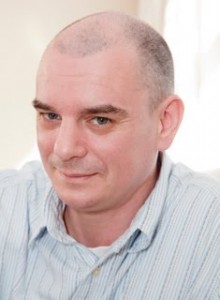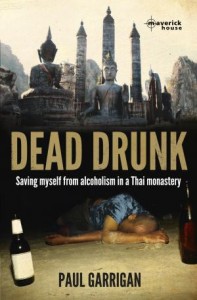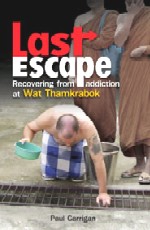 Paul Garrigan is an Irish writer who has been living in Thailand since 2002. He was born in 1969 in Dublin and he has published, until now, two books of non-fiction: Last Escape (2008, Bangkok Books) and Dead Drunk (2010, Maverick House). Both books are about the author’s alcohol addiction and his miraculous recovery. From Minburi Thailand, Paul talks about his books, writing, Thailand, and his future projects.
Paul Garrigan is an Irish writer who has been living in Thailand since 2002. He was born in 1969 in Dublin and he has published, until now, two books of non-fiction: Last Escape (2008, Bangkok Books) and Dead Drunk (2010, Maverick House). Both books are about the author’s alcohol addiction and his miraculous recovery. From Minburi Thailand, Paul talks about his books, writing, Thailand, and his future projects.
“I would like to think that Dead Drunk is more than just about addiction.”
Voicu Mihnea Simandan: In the past two years, you have authored two books about your alcohol addiction. As a teetotaler, I didn’t realize that there are people who are willing to read about this topic.
Paul Garrigan: I would guess that the majority of people who have read my books were never addicted to alcohol or drugs; despite this they still seem to relate to my story. I suppose most of us can understand what it is like for life to go wrong and then have to recover from this – my story is an extreme case of that type of journey. My purpose with this work wasn’t to titillate people with stories of my fall into depravity, but more to show how we can turn our life around no matter how far we fall.
My intention with Dead Drunk was to write something that would have given me hope while in the midst of addiction. For many years I devoured this type of book; desperate to hear that escape from alcohol abuse was possible. When things get bad it is tempting to just give up and say that this is as good as it gets for me; hearing that other people took a different path can be inspiring and motivational
I would like to think that Dead Drunk is more than just about addiction; it is about how we all can get second chances. I sometimes receive emails from individuals who feel they have totally messed up in their life even without hitting the booze; I see my story as evidence that no matter how low you go there is always a way back.
VMS: How were the two books received?
PG: The two books are quite different and so has been the response to them. Last Escape was focused on my time at the detox temple and came directly from a blog. My original intention was not to get this material published as a book but just to tell my story. The response to the blog was enough though to encourage me to try and get it into print. Last Escape was released here in Thailand by a local publishing company. It was great to see the book in shops here but the nicest thing was having people contact me to say that the book helped them in some way. The book could have been written better but I’m proud of it all the same
Dead Drunk was only released a few months ago but the response has already been a lot bigger than I expected. I knew that by the time I’d finished writing it that I’d told my story the best way I could; I just wasn’t sure how people would respond. I had been warned that releasing a book this time was going to be different than just releasing it in Thailand – the response still caught me by surprise. Maverick House did a great job of promoting the book and we had a lot of publicity back in Ireland. There was about a three week period where I was spending all my time travelling from one interview to the next; appearing on radio, TV, and talking to reporters. This was all great for my ego, but there was a bit of a come down afterwards when I returned to Thailand – it is easy to understand how people can become addicted to the attention.
Dead Drunk only became available in Thailand a few weeks ago, but it does seem like there is already a lot of interest in it. I’m basically quite a self-effacing person, but I do feel that this book contains a story that will carry a hopeful message to a lot of people – I’m biased though.
“My life today is full of happiness.”
 VMS: You are very honest in Dead Drunk. Most former addicts, no matter if they had a drug or alcohol addiction, would rather not mention their dark past. You seem to do the exact opposite.
VMS: You are very honest in Dead Drunk. Most former addicts, no matter if they had a drug or alcohol addiction, would rather not mention their dark past. You seem to do the exact opposite.
PG: My life today is full of happiness; I actually look forward to getting up out of bed in the morning – a few years ago I’d wake up in tears because I was still alive. I would not be where I am today without my past and everything had to happen just the way it did; I’m a product of all the bad as well as all the good. I think a lot of people suffer because they are haunted by their past; I’ve been liberated by mine.
I once ended up begging on the streets of London but I don’t feel any shame about this. If you learn from your mistakes there is no need to be ashamed about anything; at least that’s how I see it. I also feel that admitting my previous failings proves that it is possible for real change to occur; for a long time I worried that people couldn’t change – I’m proof that they can.
VMS: Would be it farfetched to say that your experience at Wat Thamkabok, the Thai temple where you overcame your addiction, was a cathartic one?
PG: You could say that. I had reached my bottom and felt completely willing to do anything to escape my addiction. I believe that when the student is ready the teacher will appear; Thamkrabok was the perfect teacher for me at that time. The temple gave me the space to detoxify my body and provided me with tools to use in recovery. The monks gave me hope and for that I’ll always be grateful.
VMS: How did you feel when you had your first copy of Dead Drunk in your own hands?
PG: I first held a copy of the book back in Ireland. It was released there in April 2010; two months before Thailand. I was back home to help promote it. It was a very proud moment to actually have it in my hands. Maverick House did a fantastic job with the cover and I was pleased with everything.
“The most pleasant experience at Thamkrabok
was the feeling that we were all in it together.”
VMS: For recovering addicts, what is, on one side, the most disturbing, and, on the other side, the most pleasant experience they will encounter at Tratkabok Temple in Saraburi Province.
PG: The most disturbing aspect of the treatment has to be the vomiting in the evenings. You do this as part of a group and there are onlookers to cheer you on – it has quite a festive feel to it. One of the monks gives you this special herbal potion that makes you feel very ill; in order to remove this concoction from your body you need to drink scoop after scoop of water. You basically end up with projectile vomiting for fifteen minutes with a crowd singing Thamkrobok songs to motivate you. The purpose is to detox your body, but it also teaches humility. This does feel quite upsetting at the time but the medicine was part of my escape from addiction so I’m very grateful to it.
The most pleasant experience at Thamkrabok was the feeling that we were all in it together. Many of the monks are ex-addicts and they know exactly what you are going through. There are no group meetings or anything like that but everyone just pulls together – we all come from different background but at the temple we are the same. We would sit long into the night talking about our hopes and dreams; even the lowest addict has hopes and dreams it seems.
“Writing for fun and writing for pay is not the same thing at all.”
 VMS: A few months ago you have bought your own web domain and now are hard at work developing a comprehensive blog. How important is it for a writer to have an online portfolio and be tuned in the different social media tools available?
VMS: A few months ago you have bought your own web domain and now are hard at work developing a comprehensive blog. How important is it for a writer to have an online portfolio and be tuned in the different social media tools available?
PG: I previously had blogs, podcasts, and articles spread out all over the net – it was a bit of a mess. I wanted something that was going to be a home for everything. I do think that it is important for writers to understand and use social media; even the top publishers in the world now seem to expect their writers to do a lot of publicity for themselves.
VMS: You have quit teaching in order to fully concentrate on your writing. Is it really a financially viable option for aspiring authors?
PG: I’m not sure if it a viable option for all writers. Writing freelance often means that you have little control over the subject matter; especially when you’re starting out. You also have to be able to put a lot of hours in every day; there is no such thing as writer’s block – if you don’t write you don’t get paid. Writing for fun and writing for pay is not the same thing at all. I love getting paid to write though and can’t imagine ever doing anything else. In the beginning I worried that there wouldn’t be enough work but I now have to say no to projects all the time. It is coming up to a year now as a freelancer and it was definitely the right move for me.
VMS: As you are a full time freelance writer, I would like to know your opinion regarding Suit101 and Associated Content. Is there a real revenue making opportunity on these sites?
PG: I think that a minority of people can make a reasonable amount of money from AC and possibly Suite 101; there are a lot better ways to make money though. I have used both websites and it was a generally positive experience. One of my main motives for joining in the first place was as a way to provide examples of my work; I felt this was important when beginning work as a freelancer. I just wanted to have something to put on my CV. I’m not sure how much this actually helped as none of my clients found me through AC or Suite 101. I have heard other people claiming to get work this way.
As far as I’m aware AC now only pays American nationals and featured contributors outside of the US. Things changed a few months so anyone joining from outside of the US won’t get paid unless they manage to become featured; this all has to do with paying taxes in the US. I just happened to already be a featured contributor and this is why I stayed with them for so long; they were paying me $10 an article plus a commission on the hits I received. In recent weeks I’ve stopped writing articles for AC because it just isn’t cost effective for me to do so anymore – I just don’t have the time.
I think Suite 101 is good because they review each of your articles. This means that you have somebody checking your work for web suitability; things like SEO and so on. This type of direction can be handy starting out. I think that if somebody submitted a lot of articles they could then possible make a reasonable amount of money. I have stopped writing for them as well due to my time constraints.
I think that joining Suite 101 or AC as a way to make a living is probably not such a great idea. It takes a lot of effort and those who are making money have been doing it for a long time. I think that it would be far more effective if people use this effort to create their own website and make this a success.
“I like the type of memoir writing I’m doing now.”
VMS: What is your writing routine?
PG: I love to work in the mornings. I focus on paid work between about 5am and 4 pm five days a week; I also put in a half day on Saturday. In the evenings I focus on my own writing and promoting Dead Drunk.
VMS: What is your take on the books published by farang writers here in Thailand?
PG: I think it’s a mixed bag; mostly good though – there are only a couple of books that I really didn’t get any enjoyment out of at all. There are definitely some talented writers based in Thailand who put out interesting work – authors like John Burdett spring to mind. Andrew Hicks was one of the first people who encouraged me to move from a blog to a book; I enjoy his writing as well.
VMS: You lived in the provinces for quite some time. For a writer, what are the advantages and the disadvantages of not living in the Capital?
PG: I actually moved to Minburi a few months ago so I’m now a lot closer to everything now. The reason for our move was my son’s education. In regard to writing I don’t think it matters so much where I live. So long as I have a good internet connection I’m happy.
VMS: What book project are you working on right now?
PG: At the moment my priority is promoting Dead Drunk. In a strange way I’d almost feel unfaithful if I began working on something else at this stage. A lot of people put their faith in my book and I want to be sure that I’ve done all I can for it. I’m not particularly focused on selling x amount of copies; I just want to feel that I’ve done everything possible. I do expect to write more books in the future, but who knows. I trust that my path in recovery is going to take me to some more wonderful places – the great thing is I never know what is going to happen next.
VMS: Have you ever considered writing fiction?
PG: I have written fiction but I’m never happy enough with it to try and get it published. I have a completed second draft of a novel on my computer but I haven’t touched it in a couple of years. Maybe one day I’ll go back to it. I like the type of memoir writing I’m doing now so will probably continue with this type of thing for a while longer.
VMS: Thank you for your time. I’m looking forward to reading your next book.
Voicu Mihnea Simandan
Bangkok, Thailand
September 13, 2010

My reaction to ‘Last Escape’ was that it was an electrifying story by a very talented writer. I never thought I’d be reading about alcoholism but it turned out to be a book that taught me a lot and that was totally compelling. I’m so happy to see Paul’s success with his second book and with his free lance writing. He richly deserves it, especially because of his infectious passion for his work. I know all too well that writing can become addictive!
Andrew Hicks
Thanks again Andrew. I consider you to not only be a gifted writer but the fact that you are also willing to encourage other people says a lot about you. Your comments on my blog posts a few years ago really meant a lot to me at the time; they encouraged me to keep going.